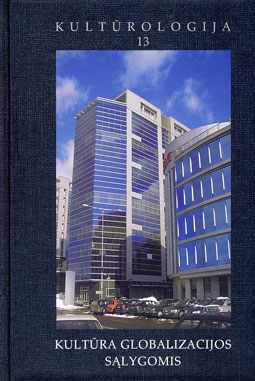Darbas ir laisvalaikis: naujos jų tarpusavio ryšio sampratos paieškos
Work and Leisure: a New Search for a Perception of their Relationship
Author(s): Aida SavickaSubject(s): Cultural Essay, Political Essay, Societal Essay
Published by: Lietuvos kultūros tyrimų
Keywords: work; leisure; Lithuania; postindustrial society
Summary/Abstract: The concepts of work and leisure are closely related in sociological literature. In fact, sociology of leisure has originated as a branch of sociology of work, and the latter was based on the assumption that economic institutions create the nucleus of a society, and economic roles of individuals determine other their obligations and privileges. Out of this logic has arisen the perception of leisure as a secondary activity, a derivation of work, with its main function of physical rest and recreation. Such deterministic approach to leisure, however, is no more as pervasive as previously: nowadays leisure is granted the status of independent and significant dimension of life that has its autonomous meaning, but not the leftover of other, more important and rational, spheres of human life. There are several important aspects in this shift of the perception of leisure. First, leisure became to be treated not as empty time, free of significant activities, but as a time filled by valuable pastimes that create sovereign systems of meanings. Second, the autonomous value of leisure was acknowledged independent of professional work or any other context. Even though the attempts to negate the essential relation of leisure to work, family, and friends are rare, it is emphasized more and more often that leisure has much more diverse meanings than simply a remnant of other activities. What is the "real" leisure, then? According to the description of famous researcher of leisure psychology John Neulinger (1974), leisure is an experience based on inner motivation and subjective feeling of freedom. Such a definition, however, is quite abstract to serve as a guideline for empirical division between professional and leisure activities. In this respect, much more tangible is Max Kaplan's (1960) conception of leisure that became a classical one. According to it, leisure is an antithesis to "work" as an economic function that is related to a pleasant expectation and recollection as well as to a psychological perception of freedom; leisure involves a minimum of involuntary socialrole obligations and may range from inconsequence and insignificance to weightiness and importance often containing activities characterized by the element of play and having a close relation to values of the culture. The ideas of different theoreticians about the sense and purpose of leisure activities are quite controversial. Even though the majority of them claim the rest after work and restoration of physical and psychological strengths necessary for tomorrow's work to be the main function of leisure, there exist other conceptions as well. According to rather hedonistic conception of leisure of French sociologist Joffre Dumazedier (1967,1974), leisure should not necessarily be oriented toward any concrete aim as it simply allows a person to free oneself from the routine of everyday practices and ways of thinking...
Journal: Kultūrologija
- Issue Year: 2006
- Issue No: 13
- Page Range: 183-204
- Page Count: 21
- Language: Lithuanian

